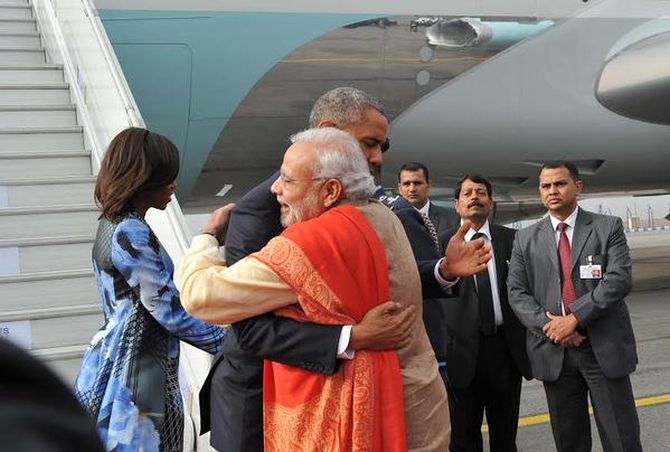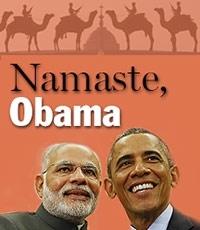 | « Back to article | Print this article |
 'A three generation US-Pakistan relationship is not likely to be snapped any time soon. All this presents an irritant to an India that wishes to concentrate on economic development,' says Colonel Anil A Athale (retd).
'A three generation US-Pakistan relationship is not likely to be snapped any time soon. All this presents an irritant to an India that wishes to concentrate on economic development,' says Colonel Anil A Athale (retd).
Former US ambassador to India Frank Wisner made a very pithy observation while addressing graduating students at Mayo College that India's educated class tends to see politics as a 'spectator sport'! The same analogy holds true for foreign relations as well and a dose of realism is well worth an effort.
Ever since the end of the Cold War in 1992, it was expected that relations between the two 'estranged democracies', the United States and India, would improve and the two nations would be partners, if not allies.
Despite a near quarter century since, relations are yet to take off. Structural, historical and political reasons have led to this situation.
The US is a global power and has interests in all regions of the world while India, a regional power, is interested in its immediate neighbourhood of South, West and South-East Asia.
As a part of its global role the US has divided the world into regions. In its definition of Central Asia and the Asia-Pacific region, the boundary between the two runs along the India-Pakistan border.
This American arrangement has split the strategic unity of the Indian subcontinent and many of the India-US woes could be directly attributed to this as the US departments and military commands (Centcom and Pacific Command) enjoy substantial autonomy in decision making and have institutional momentum.
To be fair, the US has consistently tried to alter geography by getting Pakistan to be part of West Asia. The starkest example of this attempt is the desert palm trees planted at great cost in sub-Himalayan Islamabad. On the Indian side, the foreign service is so tiny (smaller than the city state of Singapore) that it is often unable to focus on more than one issue/country at a time.
 As if the structural factors were not enough, India-US relations carry a huge millstone of historical baggage. During the Cold War, India was firmly put in the Soviet camp. Post the Cold War as well, the desire to reward old allies and punish Soviet clients dominated.
As if the structural factors were not enough, India-US relations carry a huge millstone of historical baggage. During the Cold War, India was firmly put in the Soviet camp. Post the Cold War as well, the desire to reward old allies and punish Soviet clients dominated.
The US support to secessionists in Kashmir in the 1990s (separatists agitators often shouted slogans of 'Bill Clinton Zindabad' as a token of this) and the attempt to 'outsource' the Indian sub-continent to China for strategic management were its manifestations.
Even if one can forget history as part of US global politics, the lasting damage done during the Ronald Reagan era when the US helped Pakistan go nuclear continues to plague the sub-continent. Even the radicalisation of Islam that was used as a tool in the Afghan war against the Soviet Union had its spill over into India. That the US and Europe are now victims of the same demon is cold comfort to India.
Many analysts, including I, were of the view that in the emerging China-US confrontation and the post 9/11 world, there was convergence of US and Indian interests. One must admit that this was a rather premature conclusion. The US-China dynamics has not followed the Cold War script and the relationship is more competitive than confrontational.
Neither has India signed on the dotted lines to needlessly confront China. On the terrorism front, double standards continue to operate.
The murky background of the Islamic State episode shows that the West in general and the US in particular are still not got over their predilection for 'using' radical Islam for geo-political objectives.
On the other hand there is inadequate appreciation of the fact that India, home to the second largest Muslim population in the world, had to face the music due to the spillover effect.
An additional irritant in the relations is the American bolstering of Pakistani conventional war capabilities under the guise of fighting terrorism. It has not reached the ludicrous stage of the Afghan war era when the Reagan administration supplied Harpoon anti-ship missiles to Pakistan in a confrontation in a landlocked country.
The charitable explanation is that US bought the Pakistani argument that it faces an 'India threat' and that a conventionally strong Pakistan is less likely to use its nukes.
Both these arguments lack military logic, but a three generation US-Pakistan relationship is not likely to be snapped any time soon. All this presents an irritant to an India that wishes to concentrate on economic development.
The story of irritants is not one sided. The US is equally unhappy with Indian support to Russia on the merger of Crimea and the continuing defence collaboration between the old friends. India's steadfast sympathy to Iran is equally bothersome for the US that sees no good in Iran.
The final straw for the US commercial interests was when India chose the French Rafale fighter aircraft over the US offer and the new nuclear reactor sale still eludes American companies while Russia and France have made gains.
None of the above factors and issues are going to be resolved in a short time frame. India has a great opportunity to exercise its 'soft power' to begin a new partnership with the US.
The politically and economically significant Indian Diaspora can play a major role in putting the relationship on a sound footing. In close elections in the US, opinions of Indian-origin Americans begin to count.
Political scientist Samuel Huntington once remarked how Bollywood continues to churn out more films than Hollywood. Indian cultural resilience has to be seen in the context of the decline or near demise of the film industry in Europe. Indian philosophy, yoga and medicine continue to make inroads into mainstream American society.
Luckily for us, we have a government in India that is not shy of connecting with people of Indian origin or promoting Indian culture since the vocal minority seems to have lost its veto over these issues.
REDIFF RECOMMENDS
Image: Prime Minister Narendra Modi hugs US President Barack Obama as Michelle Obama, in a Bibhu Mohapatra dress, greets other members of the welcoming party at the India Air Force's Palam air base, January 25, 2014.
Colonel Anil A Athale (retd) is a military historian and coordinator of the Pune-based Initiative for Peace and Disarmament.